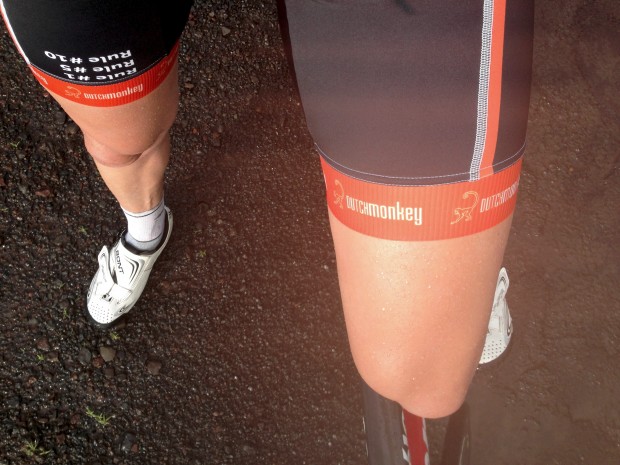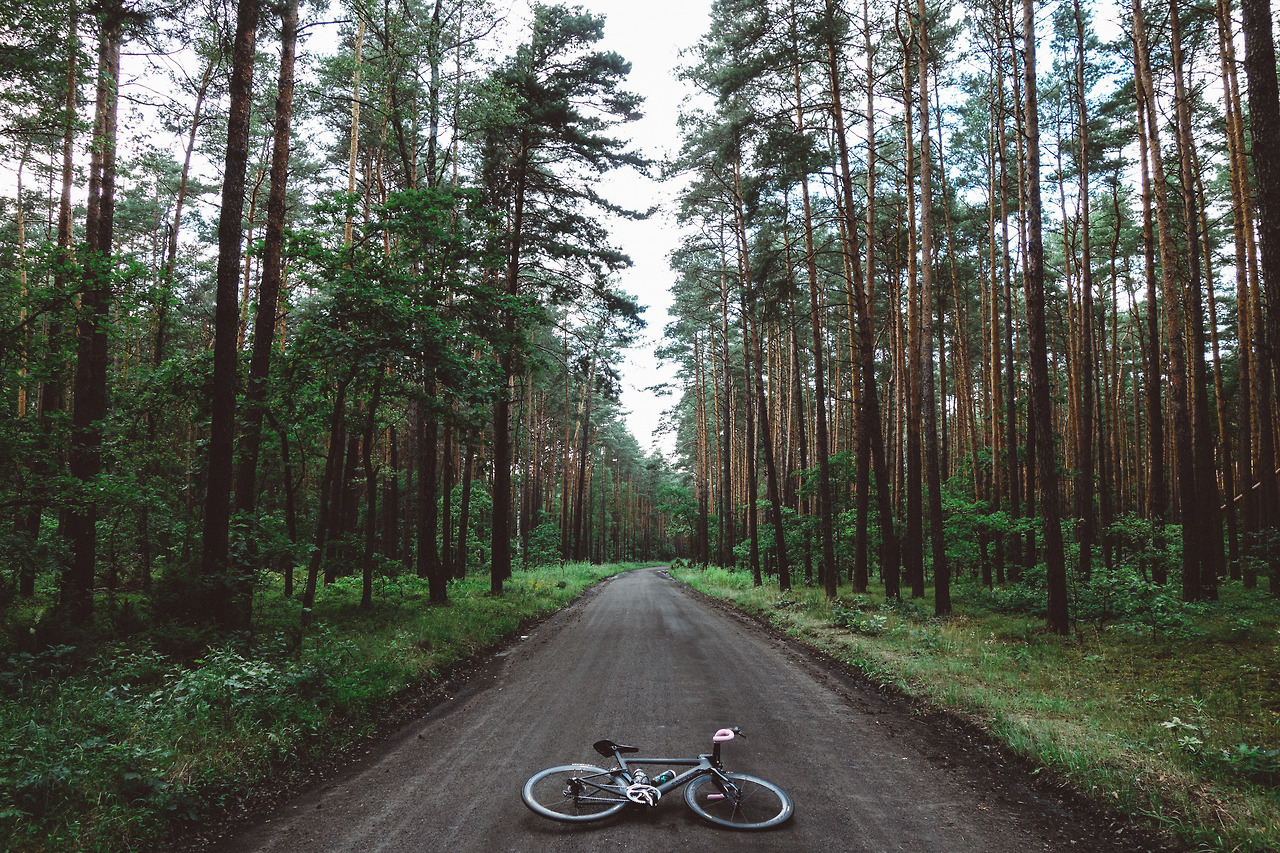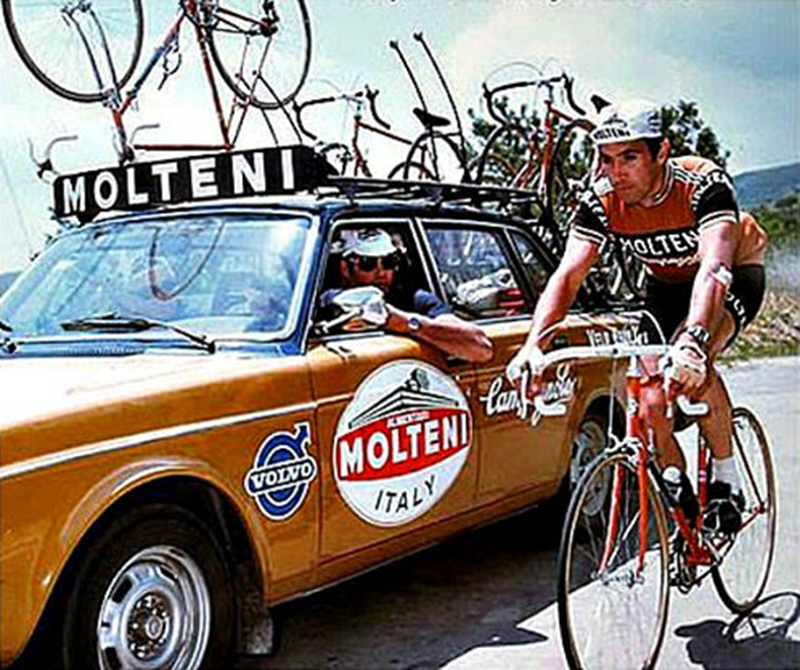Voices and Echoes

Doubt. It speaks in whispered tones but echoes in our actions and lingers heavy on the mind. It is a thing that weaves itself into the seeds of our dreams and erodes vision into whim. Doubt leads to uncertainty; uncertainty to fear; fear prevents us from reaching as high as we might.
Doubt is a clingy thing. Like a snowball dropped down a mountainside in a cartoon, it starts small but grows upon its own weight. It continues to collect more doubt until finally it crushes any positive thought. Doubt is the fundamental element of the Anti-V.
As Cyclists, our morale rests on a knife’s edge where the slightest drop of grace can send us into the waiting arms of La Volupté while even the smallest grain of doubt can draw us to the cold anvil of her husband, the Man with the Hammer. Little things such as a freshly wrapped set of bars or a recently cleaned and silenced drivetrain can send morale skyrocketing, even in otherwise atrocious conditions. An elusive click or creak, on the other hand, can coax squares from even the most magnificent of strokes.
Clicks, creaks, or a misfiring drivetrain are guaranteed to send me into a tailspin of frustration and doubt; if my machine disobeys the Principle of Silence or malfunctions, I am sure to face a dismal day on the bike. Clean kit and freshly shaven guns, particularly when the guns are glistening with sweat or rain, is for me one of the greatest sources of form and good morale. To see the muscles moving under the smooth, tanned skin as they strain with effort instantly sends away any lingering doubt and leaves only optimism and drive, my conditioning and training cease to hold sway over my desire and willingness to suffer. And when we are willing to suffer, we can do anything.


@brett
Discussed here and here among other places.
@frank
Indeed. The pros that are riding discs and talking them up are being paid to do so. Any of the elite European riders are still on cantis, but then they’ve got mechanics continually dialing in their setups week after week. I too like the Mini-Vs, especially if the bike is going to see any use on the road/gravel since they do away with fork shudder. The only issue i’ve found with the Mini-v is pad clearance in terribly muddy conditions, but honestly when it the conditions are that bad, chances are you’ll be faster running your bike than riding it. I run a mini V in front and a low profile canti in the rear and have been plenty happy with the setup. I’m considering swapping the rear canti for a Mini-V, but decided to start by just replacing the crap pads that came on the cantis with Kool Stop Cross road cartridge holders and go from there. If that doesn’t get me where I want, I’ll pull the canti and put those pads on a 926AL.
@Nate
There’s no way brake fluid would ever get to a high enough temperature to boil on a road bike. Think of the braking forces and heat build up of a Formula 1 car or Moto GP bike for example. And a downhill mountain bike is putting out a lot more braking force than a road descent. I think the road disc naysayers are just looking for any excuse to deride them (pardon the pun)… If you don’t like them, just say “I don’t like them” and keep riding calipers (which are more likely to heat up your rim to a dangerous point on this ‘long descent’ and cause a tube to burst).
All great points. I totally agree that for a road bike to make use of disc brakes does have to be designed from the ground up to do so, and not just to be able to bolt on the bits, but to be able to deal with the new forces. Will future calipers feature fins to better dissipate heat? Maybe. Will they need to run ATE DOT-4 Super Blue to avoid boiling the fluid? Perhaps.
When you think back at the disaster that Mavic’s early electronic shifting was in the 90s and how common place electronic shifting has become, and how back then I though how ridiculous an idea it was (still on the fence about Di2/EPS), I’m thinking road discs are going through the same awkward pimply face phase right now. I just don’t think it’s going to take 15 years to things to get sorted out.
As a Fat Bastard on an MTB on a long descent I’ve had brake fade the same as you get in a car when you cook the disks.
Because I’m very mean I don’t use hydraulics on my MTB so the only cause of fade is the rotor getting red hot as I hold the lever in my famous death grip (ok possibly pad contamination might be a factor but the episode that nearly ended me the summer before last was on a dry day with new clean pads and rotors).
Put it this way – I wouldn’t be comfortable on a long steep descent on a road bike with disks. Stacking it on a forest trail at 30kmph is one thing at 70kmph on a bend on the open road entirely another.
I think the problem with the Bike Rumour guy who crashed was more due to the stupidly minimal rotors he was using… I’ve never seen that much heat discoloration ever on any rotor. There’s hardly any surface area at all on that thing!
The thing with road discs is, are they really necessary for the majority of us? Are they ugly on a road bike? And will you be willing to fork out for a new bike that is compatible?
@the Engine
How new? As you might have discovered, it takes a while for new pads to burn in–to lay down an even layer of pad material on the rotor. Until that happens, in anywhere from a dozen to two dozen hard stops, they work like shite.
@CanuckChuck
Maybe at some point I’ll be won over to the idea. I still can’t like the notion of electronic shifting.
@PeakInTwoYears
Thought of that: they were bedded in and working well before the ride and the fade wasn’t progressive – got halfway down a steep bit and they just stopped working. It never occurred to me that they’d fade like that and it was only after I got up off the ground, swore about the hole in my leg, took a look, tried to adjust them and burnt my fingers that I realised what the problem was.
@the Engine
Ah. That sounds like no fun at all.
@the Engine
I think the bottom line is: if you’re braking a shit ton, you’re fucked.
Tubulars: Melted glue, tire rolled.
Clinchers: Heated up inner tube, tire blowout (possibly the scariest of the scenarios as a real blowout that takes the tire off the rim makes it very clear why we chose rubber over aluminum as a control surface.)
Disc brakes: super-heated rotors and whatever theoretical disasters can occur when using non-formula one fluid.
Basically, learn to ride your bike properly on a descent, understand the risks, and do your best to mitigate them.
@frank
I’m getting better a downhill now – half a winter’s practice with the club on the MTB is beginning to have some effect. Managed to keep the rims from overheating in the Pyrenees last summer but still ate up brake pads.
I put it all down to a bad crash I had a few years back but I’m slowly but surely making myself descend better. Who’d have thought Rule #64 and Rule #85 would be so challenging?
Wow! Just, plain wow! “And when we are willing to suffer, we can do anything.” Thanks, Frank! I needed that.
@Ron I like your thoughts. I came back to riding 3 years ago (Triathlon actually) @ the tender age of 39. I used to TT a bit as a youngster. Last winter, I had a go at the Velo29 winter series – criteriums on Croft motor racing circuit. What a buzz. I too didn’t think I could hang in there with the bunch. I started with the Cat4 race – 20 miles or so @ av 23.5mph. Managed that. Then I went into the Cat E/1/2/3/4 race (30 miles) and managed (just) to stick with them @ av 27.5mph. That was one of the best experiences of my life. I drove home with such a buzz. Reading about Paris-Roubaix, how do the riders manage the race…it sounds Brutal? Av speed 27mph.
goro s 値段